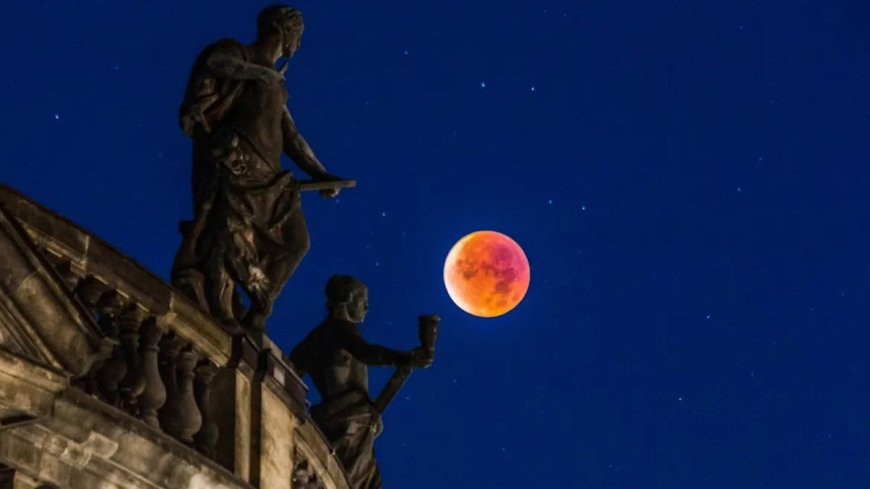Lunar Eclipse 'Blood Moon' 2025: Dos and Don’ts of Chandra Grahan and Special Tips for Pregnant Women
Lunar Eclipse 'Blood Moon' 2025 brings celestial wonder with cultural beliefs. Know dos, don’ts & special care tips for pregnant women.

Introduction
The Lunar Eclipse 'Blood Moon' 2025 is one of the most awaited celestial events of the year. Known in India as Chandra Grahan, this astronomical spectacle has both scientific explanations and cultural beliefs associated with it. While many watch it in awe, traditions caution against certain practices, especially for pregnant women, as it is believed to have harmful effects. Let’s explore its timings, reasons, myths, safety tips, and significance.
History and Scientific Background
Lunar eclipses have fascinated humankind for centuries. In Vedic astrology, the Chandra Grahan is considered a spiritually sensitive time. Scientifically, a blood moon occurs when Earth comes between the Sun and Moon, casting a shadow that makes the Moon appear red due to Rayleigh scattering of sunlight.
Historically, eclipses were seen as omens, but today we know they are astronomical events that occur regularly. Still, cultural traditions and precautions remain deeply rooted, particularly in India.
Date and Timings of Lunar Eclipse 'Blood Moon' 2025
-
Date: September 7, 2025
-
Start Time (Penumbral Phase): Around 6:45 PM IST
-
Partial Eclipse Begins: Around 8:00 PM IST
-
Total Eclipse (Blood Moon Phase): From 9:30 PM to 11:15 PM IST
-
End Time: Around 12:45 AM IST (September 8, 2025)
These timings may slightly vary depending on geographical location.
Why Does a Lunar Eclipse Happen?
A lunar eclipse occurs when the Earth’s shadow falls on the Moon. The "blood moon" happens because red wavelengths of sunlight bend around Earth’s atmosphere and reach the Moon, while shorter wavelengths scatter away.
Why Pregnant Women Are Advised Extra Caution
In many cultures, pregnant women are asked to be extra cautious during a lunar eclipse. The belief is that the eclipse’s negative energy could harm the unborn child. While science does not confirm these effects, traditions suggest:
-
Avoid going outdoors during the eclipse.
-
Do not use sharp objects like knives or scissors.
-
Refrain from cooking or eating food during the eclipse.
Key Tips for Pregnant Women During Chandra Grahan 2025
-
Stay Indoors until the eclipse ends.
-
Avoid looking directly at the moon to prevent anxiety or stress.
-
Chant mantras or meditate for positivity.
-
Place Tulsi leaves in food and water to protect them from negative energy (traditional belief).
-
Rest well and keep a calm environment.
Is the Blood Moon Harmful to Others Too?
For the general public, the lunar eclipse is not physically harmful. However, cultural practices recommend not eating or drinking during the eclipse period and performing a bath and prayer (snan-daan-puja) after it.
Key Points and Updates
-
The 2025 Blood Moon is visible across Asia, Africa, Europe, and parts of Australia.
-
Astronomers call it a celestial wonder, while astrologers view it as a time of caution.
-
Many temples close during the eclipse and reopen after purification rituals.
Advantages and Disadvantages
Advantages:
-
A rare opportunity to witness a celestial event.
-
Scientific learning and sky-gazing experience for students and astronomers.
-
Cultural and religious rituals strengthen traditions.
Disadvantages:
-
Causes fear and myths among people.
-
Restrictions for pregnant women may lead to stress.
-
Religious closures affect normal activities.
Positive and Negative Significance
Positive:
-
Strengthens awareness of astronomy and spirituality.
-
Encourages community prayers and rituals.
Negative:
-
Fear and misinformation may create unnecessary anxiety.
-
Pregnant women may feel pressured due to cultural taboos.
Final Thought and Conclusion
The Lunar Eclipse 'Blood Moon' 2025 is not just an astronomical wonder but also a time of spiritual reflection in many cultures. While science assures us that eclipses are natural and harmless, cultural traditions emphasize caution, especially for pregnant women. The best approach is a balance of science and tradition: enjoy the beauty of the eclipse safely, while respecting cultural practices that bring people together in faith and belief.

 Ellofacts
Ellofacts 





